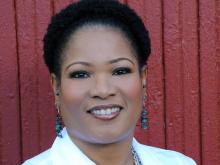
Food Politics
Presented in partnership with the UW-Madison Center for the Humanities, three of the country's foremost authors on Food Politics gather to discuss the transformative power of food in our communites, including food security, food justice, and food as means of liberation. Jennifer Gaddis, author of The Labor of Lunch, Monica White, author of Freedom Farmers, and Anne Zeide, author of Canned, will engage in a wide-ranging discussion about many of the most pressing food issues facing society today.
About The Labor of Lunch: There’s a problem with school lunch in America. Big Food companies have largely replaced the nation’s school cooks by supplying cafeterias with cheap, precooked hamburger patties and chicken nuggets chock-full of industrial fillers. Yet it’s no secret that meals cooked from scratch with nutritious, locally sourced ingredients are better for children, workers, and the environment. So why not empower “lunch ladies” to do more than just unbox and reheat factory-made food? And why not organize together to make healthy, ethically sourced, free school lunches a reality for all children? The Labor of Lunch aims to spark a progressive movement that will transform food in American schools, and with it the lives of thousands of low-paid cafeteria workers and the millions of children they feed. By providing a feminist history of the US National School Lunch Program, Jennifer E. Gaddis recasts the humble school lunch as an important and often overlooked form of public care. Through vivid narration and moral heft, The Labor of Lunch offers a stirring call to action and a blueprint for school lunch reforms capable of delivering a healthier, more equitable, caring, and sustainable future.
About Freedom Farmers: Freedom Farmers is an incredible love letter helping Black people return to and reclaim our true agrarian, radical, collective selves. Through this important book, Dr. White brilliantly disrupts the disempowering narrative that Black communities have a painful relationship with farming and land. While Black people have suffered tremendously via exploited labor and the violence of slavery in this country, that is not the summation of our history with land. Dr. White documents important historical lessons for us and shows us what we’ve known and at times forgotten–that the land both heals and frees us. In the late 1960s, internationally renowned activist Fannie Lou Hamer purchased forty acres of land in the Mississippi Delta, launching the Freedom Farms Cooperative (FFC). A community-based rural and economic development project, FFC would grow to over 600 acres, offering a means for local sharecroppers, tenant farmers, and domestic workers to pursue community wellness, self-reliance, and political resistance. Life on the cooperative farm presented an alternative to the second wave of northern migration by African Americans–an opportunity to stay in the South, live off the land, and create a healthy community based upon building an alternative food system as a cooperative and collective effort. Freedom Farmers expands the historical narrative of the black freedom struggle to embrace the work, roles, and contributions of southern black farmers and the organizations they formed. Whereas existing scholarship generally views agriculture as a site of oppression and exploitation of black people, this book reveals agriculture as a site of resistance and provides a historical foundation that adds meaning and context to current conversations around the resurgence of food justice/sovereignty movements in urban spaces like Detroit, Chicago, Milwaukee, New York City, and New Orleans.
About Canned: A century and a half ago, when the food industry was first taking root, few consumers trusted packaged foods. Americans had just begun to shift away from eating foods that they grew themselves or purchased from neighbors. With the advent of canning, consumers were introduced to foods produced by unknown hands and packed in corrodible metal that seemed to defy the laws of nature by resisting decay. Since that unpromising beginning, the American food supply has undergone a revolution, moving away from a system based on fresh, locally grown goods to one dominated by packaged foods. How did this come to be? How did we learn to trust that food preserved within an opaque can was safe and desirable to eat? Anna Zeide reveals the answers through the story of the canning industry, taking us on a journey to understand how food industry leaders leveraged the powers of science, marketing, and politics to win over a reluctant public, even as consumers resisted at every turn.
Jennifer Gaddis

Jennifer Gaddis is an associate professor of Civil Society and Community Studies at the University of Wisconsin-Madison and the author of The Labor of Lunch: Why We Need Real Food and Real Jobs in American Public Schools (University of California Press, 2019), which won book awards from the National Women’s Studies Association and the International Association of Culinary Professionals. She is the co-editor with Sarah A. Robert of Transforming School Food Politics Around the World.
Gaddis is an advisory board member of the National Farm to School Network and has written op-eds on school food politics for popular media outlets such as the New York Times, Washington Post, USA Today, The Guardian, and Teen Vogue. She and her students regularly partner with school districts, labor unions, and social movement organizations on community-based research and advocacy projects related to food justice in K-12 schools. Dr. Gaddis is an active member of the Healthy School Meals for All Wisconsin coalition and a regular partner of the Madison Metropolitan School District.
Monica White

Dr. Monica M. White teaches courses in environmental justice, urban agriculture and community food systems at the University of Wisconsin-Madison. She is the first African American woman to earn tenure in both the College of Agricultural Life Sciences and the Gaylord Nelson Institute for Environmental Studies. Her research investigates Black, Latinx and Indigenous grassroots organizations engaged in the development of sustainable, community food systems as a strategy to respond to issues of hunger and food inaccessibility. She has presented widely on these subjects, from University of Western Cape in South Africa to UC Berkeley to the Detroit Public Library. She is the author of Freedom Farmers: Agricultural Resistance and the Black Freedom Movement (UNC Press, January 2019).
Anna Zeide

Anna Zeide is an Assistant Professor of environmental history and co-founder of the Food Studies Program at Oklahoma State University. Her first book, Canned: The Rise and Fall of Consumer Confidence in the American Food Industry won the 2019 James Beard Award in Reference, History and Scholarship. She received her Ph.D. from the University of Wisconsin-Madison in 2014, in the History of Science, Medicine, and Technology.
